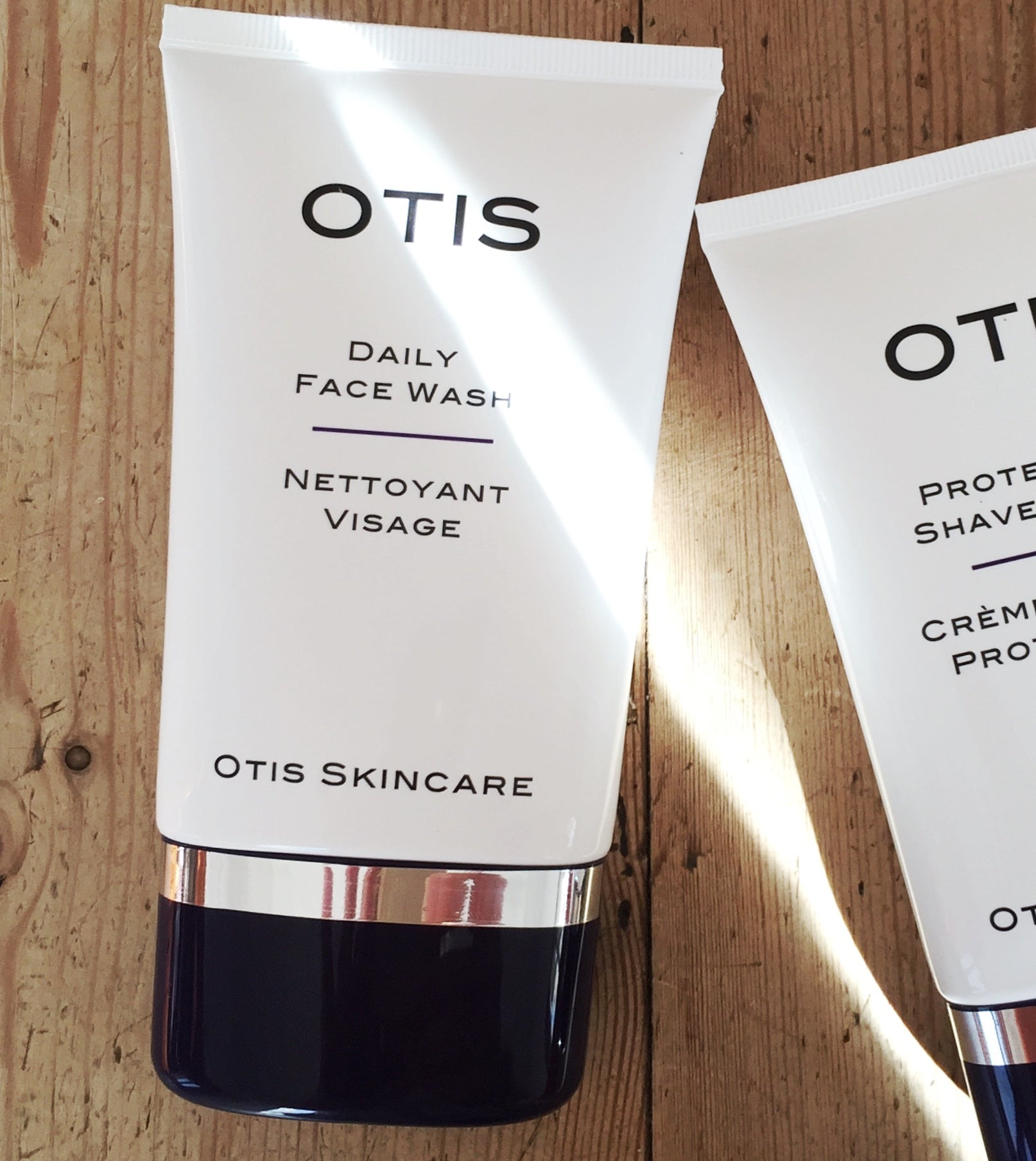You know Lactic Acid as something that builds up in your muscles during intense workouts - and causes muscle soreness later.
But when used in your face wash, Lactic Acid can make a dramatic improvement to a man’s skin.
A gentle alpha hydroxy acid (AHA), Lactic Acid exfoliates away dead skin cells, unclogs pores, and brightens your skin - leaving your face looking glowing and healthy.
Read on for exactly how lactic acid improves the texture and tone of your complexion - and the easiest way to incorporate it into your skincare routine.
Our Daily Face Wash (with Lactic Acid) exfoliates away dead skin cells and unclogs pores - leaving your face looking clean, glowing and healthy.
What is Lactic Acid?
In skincare, Lactic Acid is the most effective (and gentle) type of alpha hydroxy acid (AHA).
AHA’s are natural chemical exfoliants and they’re expert at clearing away dead skin cells and accelerating cell renewal, as well as stimulating your skin’s natural repair mechanism.
They work by gently dissolving the bonds that hold dry, dead skin cells to the surface.
So when applied to your skin in its synthesized form (typically sourced from fruit and vegetables), Lactic Acid can make an instant improvement to your complexion.
And the easiest way to do this is to find a face wash that includes Lactic Acid.
Lactic acid is suitable for all skin types
Unlike other AHA’s, such as Glycolic Acid, Lactic Acid is milder and more hydrating, but equally effective. So it’s beneficial for every type of skin.
Thanks to its slightly larger molecule size, it delivers the same results, but without any irritation. Making it one of the best exfoliators for sensitive skin types too.
What does Lactic Acid do for your skin?
Gently 'unglueing' dead skin cells from the surface will brighten your skin and reduce pore size, as well as evening out any skin discoloration (like acne marks or dark spots from excess melanin, or skin pigment).
It also acts as an antioxidant which stimulates collagen production – helping to keep your skin looking firm and smoothing any fine lines and wrinkles.
Leading to a healthy, glowing complexion…
- your skin looks brighter and smoother
- your skin tone is more even
- your pores appear smaller
- it helps get rid of blackheads
- it allows for better absorption of your moisturizer, keeping your skin well hydrated
The exfoliating action of Lactic Acid also increases blood circulation to your face, bringing nutrients to the skin’s surface.
And when it comes to shaving…
- there’s less chance of ingrown hairs
Why is Lactic Acid so beneficial for men?
It’s the build-up of dead skin cells that can lead to annoying razor bumps and ingrown hairs when you shave. Exfoliating them away with Lactic Acid stops these from forming and goes a long way to improving the overall texture of your face.
And if you have a beard, exfoliation will keep beard dandruff at bay, improve the texture of your skin under your beard and keep your hair follicles clear and healthy, encouraging strong beard growth.
We answer more of your questions on exfoliation here – “Your Ultimate Guide to Exfoliation: FAQ's”.
And we've got a quick guide to how to exfoliate properly too: "EXFOLIATION: Dos and Don'ts".
How to add Lactic Acid to your skincare routine
When it comes to exfoliation a policy of ‘little and often’ is the best way to go.
Gently exfoliating everyday using a face wash that incorporates Lactic Acid is the most beneficial option for your skin.
We advocate using our Daily Face Wash which contains Lactic Acid, along with Aloe Vera, Tea Tree Oil and Glycerin to keep your skin smooth and hydrated, and glowing with good health.
The double action of cleaning and exfoliating - but without any dryness - makes our Daily Face Wash the best exfoliating face wash for men out there.
Leaving it on your skin for an additional two minutes will also increase the exfoliating effect.
Customer tip: Apply a pea-sized amount of Daily Face Wash to your dry face just before stepping into the shower. Leave it to work for a few minutes, then lather and rinse.
And what works best for your face applies in the same way to the rest of your body. Whether you’re exfoliating your chest, your legs or your back it’s always best to use a gentle natural exfoliant like Lactic Acid.
You can use Daily Face Wash twice a day and know that your skin is beautifully exfoliated – no dull, dry skin, no rough patches - and no need to use a rough grainy scrub!
You can also incorporate lactic acid into your skincare routine in the form of a serum or a toner. Start off with a low concentration, monitoring your skin all the time for any adverse signs, and build from there.
If skin discoloration is really a problem, you could also consider a professional lactic acid peel at a dermatologist’s office.
FAQ’s
How often can I use Lactic Acid on my skin?
It really depends on the concentration in a product, along with how sensitive your skin is.
For example, you can use a face wash that incorporates lactic acid (like OTIS Daily Face Wash) once or twice a day, even if you have sensitive skin.
But for serums or toners with a higher concentration, it’s best to start slowly. Stick to a protocol of 3 days on/4 days off, and always use it as part of your night time routine.
Will Lactic Acid make me breakout?
No. It’s a very gentle skincare ingredient and easily tolerated by all skin types, including oily and acne-prone skin.
Can I exfoliate with Lactic Acid if I have acne?
Yes. Exfoliating with Lactic Acid is the best way to exfoliate acne-prone skin.
In fact, exfoliating away dead skin cells is extremely important in the treatment of acne. This is because acne-causing bacteria actually thrive on dead skin cells.
But you should avoid grainy exfoliating scrubs at all costs! They can inflame your skin through excessive scrubbing action - and irritating an already inflamed skin is not a good idea.
This is why Lactic Acid is so beneficial for acne-prone skin types. It gently dissolves the ‘glue’ that holds dead skin cells together – but without any irritating scrub action.
Does Lactic Acid lighten skin?
As it gently removes dull, dead skin cells it will have an overall brightening effect on your complexion.
It also helps to even out any hyperpigmentation (or skin discoloration) caused by acne marks or dark spots from excessive melanin.
The Takeaway
Lactic Acid is a mild alpha hydroxy acid (AHA) which exfoliates, unclogs pores, and brightens your skin, to keep it looking glowing and healthy.
It also stimulates collagen production – helping your skin to stay firm and smoothing any fine lines and wrinkles.
And because it’s so gentle Lactic Acid is suitable for all skin types, even sensitive and acne-prone skin.
Regular use leads to a healthy, vibrant and glowing complexion…
- your skin looks brighter and smoother
- your skin tone is more even
- your pores appear smaller
- it helps get rid of blackheads
- it allows for better absorption of your moisturizer, keeping your skin well hydrated
Lactic Acid is especially beneficial for men because it dramatically reduces the chance of ingrown hairs.
This excellent ingredient can be found in our Daily Face Wash and used twice a day to keep your skin glowing and healthy.
All you need to stay looking handsome.
SHOP THE ROUTINE.
PRESTIGE SKINCARE FOR MEN.
MADE IN FRANCE.




